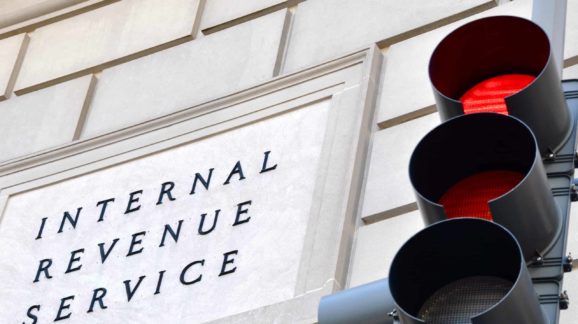IRS Needlessly Chases Minnows to Catch Whales

Photo Credit: Getty
As part of its Fiscal Year 2022 Revenue Proposals, the Internal Revenue Service (IRS) has asked Congress to authorize a sweeping new financial reporting program that would collect information on every U.S. bank, investment, and loan account, both business and personal, with a balance or annual transactions of $600 or greater. No such mandate has previously existed.
The House Ways and Means Committee is now considering whether to include the mandate in President Biden’s $3.5 trillion Build Back Better Agenda. If enacted, the massive data collection effort would begin in 2023.
The IRS already gathers a vast amount of tax information each year. Apart from the ubiquitous Form W-2 for employees, business and personal income is reported through more than two dozen information returns. This includes the well-known Forms 1099-B (Broker), 1099-Div (Dividends, 1099-INT (Interest), 1099-MISC (Miscellaneous), and the recently revived 1099-NEC (Non-Employment Compensation).
Officials argue that the proposal is necessary to close a purported $166 billion business income tax gap allegedly caused by a lack of “comprehensive information reporting” and the difficulty of detecting tax-avoidance outside the audit system. Treasury Secretary Janet Yellen contends that this tax gap is “concentrated at the top of the income distribution” and that the data collection program will target “opaque income streams” to catch wealthy tax dodgers.
As a tax attorney with private and public sector experience, I have structured deals to minimize tax consequences and prosecuted multi-million-dollar tax cases. The 1 percent simply aren’t disguising income by dispersing it through a vast network of accounts with a scant $50 of activity per month. Similarly, there is no need for the IRS to compile a financial profile on nearly every American with a bank account, loan, or credit card to pursue multi-millionaire tax cheats.
IRS employees are already at the breaking point as they struggle to use the data they currently collect. It is also facing a new wave of Form 1099-K information returns mandated by the recently enacted American Rescue Plan. Previously, companies like eBay and Etsy that facilitate third-party sales and auctions only had to report the activity of users with $20,000 in sales and 200 transactions. Next year, that reporting threshold drops to a mere $600. Not only will the IRS need to process this additional data, it will soon have to contend with occasional sellers decluttering their homes needing to prove the original cost of their secondhand goods.
A new administrative burden would also be foisted upon myriad financial institutions, both large and small. This is a particular concern for community banks and credit unions, which already struggle to implement current regulatory mandates with limited staff.
The policy further heightens privacy concerns and fears of sweeping government intrusion using “Big Data” analytics currently used by the U.S. military and intelligence community. There are also well-founded data privacy concerns. This summer, ProPublica released IRS files with the private tax information of thousands of the nation’s wealthiest people, while the Treasury Inspector General has discovered major failures to remove taxpayer information from IRS electronic equipment, including computers and phones.
Immigrant and minority communities, who are already among the least banked, will also be affected. Invasive financial reporting policies will do little to encourage their trust, especially those who have lived under authoritarian regimes with no respect for privacy.
Fortunately, the proposal is facing mounting opposition. CEI has signed onto a letter detailing the concerns of a broad coalition of free market advocates. Another letter from more than 40 trade associations has been sent to the leaders of both parties in the House.
Looking ahead, policy makers would do well to remember the fate of a financial reporting provision in the Affordable Care Act that required businesses to issue a Form 1099 every time it paid $600 or more for goods or services. That onerous policy provoked a tidal wave of opposition, and a bipartisan coalition secured its repeal in 2011 before it could take effect.
There is no need to repeat such mistakes again.